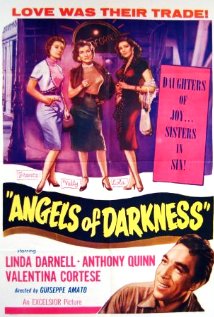| Angels of Darkness | |
|---|---|
 | |
| Directed by | Giuseppe Amato |
| Written by | Bruno Paolinelli (novel) Elio Petri Gianni Puccini Cesare Zavattini Siro Angeli Giuseppe De Santis Gigliola Falluto Giuseppe Mangione Giuseppe Amato |
| Produced by | Giuseppe Amato Tino Buazzelli Piero Cocco |
| Starring | Linda Darnell Anthony Quinn Valentina Cortese |
| Cinematography | Anchise Brizzi |
| Edited by | Gabriele Varriale |
| Music by | Renzo Rossellini |
Production company | Amato Film |
| Distributed by | CEI Incom |
Release date |
|
Running time | 94 minutes |
| Country | Italy |
| Languages | Italian English |
Angels of Darkness (Italian : Donne proibite) is a 1954 Italian melodrama film directed by Giuseppe Amato and starring Linda Darnell, Anthony Quinn and Valentina Cortese. [1]
Contents
The film's sets were designed by the art director Virgilio Marchi.